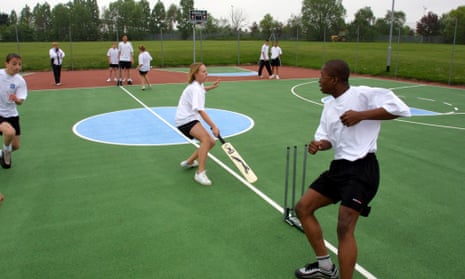The London Olympics was a chance to inspire a generation of young athletes. But after the buzz of the 2012 Games, and numerous gold medal wins for team GB, its lasting impact on school sport has come into question.
In 2013 the shadow education secretary, Stephen Twigg, said that David Cameron and Michael Gove had failed to create a legacy for school sport – despite the £150m investment that followed the 2012 Games.
So, with missed opportunities behind us, what does the future hold for physical education (PE)? A new curriculum was introduced in 2014, putting more focus on competition and physical activity, and schools have been urged to improve the health of their students in the face of growing concerns about childhood obesity.
We asked PE teachers to share their hopes and fears about the future of their subject, and what they want to change in the next decade.
We need to realise the value of PE in primary schools
In the next 10 years I hope that state schools will start to realise the importance of PE for primary-age pupils. Infants develop the important skills they need to get involved in sport when they are older. Just like private schools, my hope is that within the next 10 years every school will have a primary PE specialist. The sport premium [money designed to help primary schools improve the quality of PE] is a good start but it needs to be there for good to enable headteachers to plan by introducing the official role of PE teacher in primary schools.
Sarah Robinson is a teacher at Holt Farm infant school in Essex. She teaches two days in the classroom and then the rest of the week as a primary PE specialist
It’s time PE was taken seriously
In the next decade I would love to see a shift in mindset in relation to PE. At the moment the subject is viewed by some (if not many) as pseudo education – that is if it’s even seen as education at all. But PE teachers educate their students on anatomy, physiology, exercise science, sport and the importance of health and wellness. We have the unique opportunity to conduct lessons and units on personal and social responsibility, accountability, goal setting and leadership. We help to combat obesity, diabetes and cardiovascular disease, but I would make the case that we also positively effect other world issues, such as bullying.
Charlie Rizzuto is a PE teacher at Oyster Bay High School in the US
iPads will be at the heart of the future of PE
In PE it isn’t always easy to show pupils where they have made a mistake. Using a tablet devise means PE teachers can show how things should be done and then play this back for analysis. This is better than simply explaining to pupils where they went wrong. iPads and other tablet devices are a great way of doing immediate video analysis. As more apps are developed and used for analysis, more effective recording and assessment of pupil progress will be tracked on devices. It will be a great way to set targets for students.
We have mirrors in dance studios to review our performances and I am sure that it won’t be too long before the tablets become the mirrors of the sports field. iPads also let teachers monitor and profile pupils’ heart rates. Used effectively this is a fantastic tool for teaching about the health benefits of exercising.
Nicci Rayes is director of sport at Colfe’s school in London
Is PE at GCSE getting less physical?
Changes to the GCSE specification, which mean PE is now made up of 70% theory and 30% practical work, could have damaging consequences. Teachers may be under more pressure in the next decade to teach theory content from an earlier age, limiting practical work. GCSE PE becoming academic like other subjects could prevent more physically able and talented pupils from choosing the subject.
Tom Brush is a PE Teacher at Wheelers Lane technology college in Birmingham
Where do talented students go next?
A number of new sports have been parachuted into the school curriculum without any thought of exit strategies. Students get the opportunity to sample new sports and develop basic core skills but then have nowhere to continue their development as there are no local clubs.
Furthermore, the constant need to produce risk assessments for every activity and trust the professionalism of the teacher to dynamically assess the risk and situation means students are again missing out on opportunities.
Peter Green is subject leader in a comprehensive school in Oxfordshire. Prior to that he was head of PE at a boys’ grammar school in Buckinghamshire.
Schools need better facilities and resources
A minimum standards of sport and PE facilities at schools should be introduced, and money at the top of sport needs to be passed down to schools to engage young people in the subject. Previously it was taken for granted that a large group would want to play a sport, but now they have other things to occupy them, such as playing computer games at home. Teachers often find they are scraping together the bare numbers for all sports including football, which is typically popular.
Dave Richardson is head of PE at Danum Academy in Doncaster
We need to make sure we make the most of technology
Technology allows us to think in different ways. Instead of the lecture in a big hall we can put sessions on YouTube. Why not use technology to run a workshop with someone halfway around the world? The truth is that we aren’t currently exploring the true potential of technology in education. This requires investment not just in software but also in teachers. Teachers work long weeks and don’t have the time (with schools also not always having the funding) to learn new technological skills.
Ashley Case is a PE teacher who researches in the area of technology and pedagogy. He lectures at Sir John Beckwith Centre for Sport at Loughborough University

